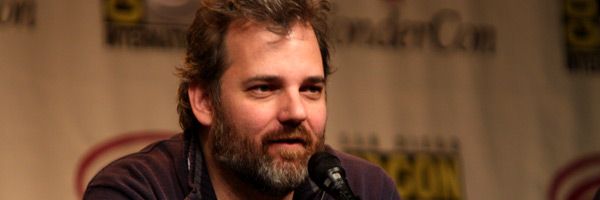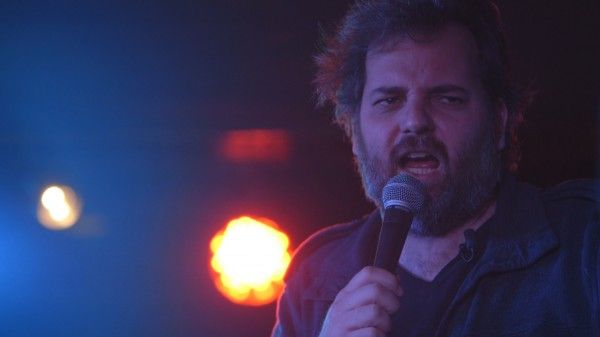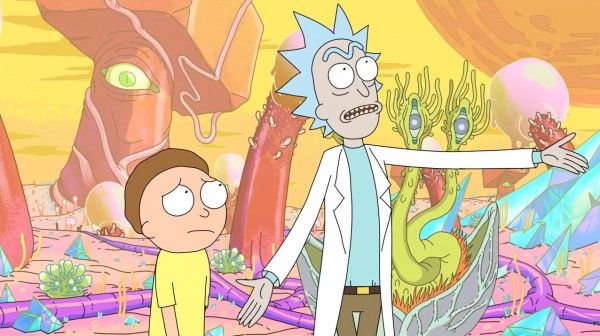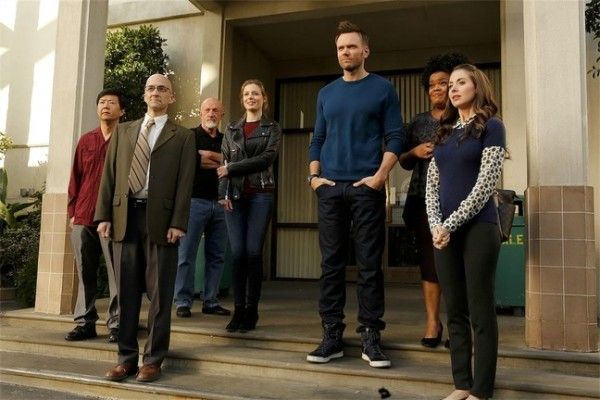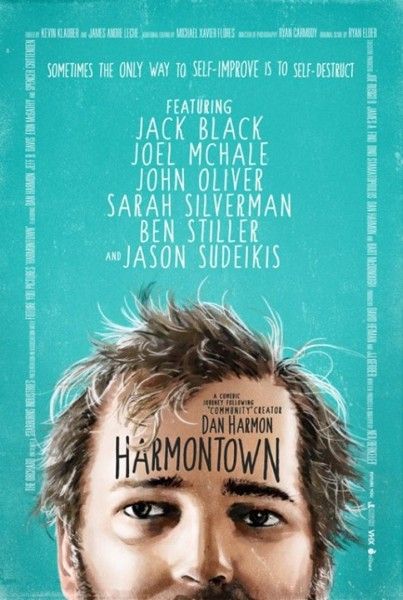As a giant fan of Rick and Morty and a viewer of Community whose regard of that show oscillates between passionate love and mild frustration, I was fairly trepidatious about watching Harmontown. The film focusses on a tour that Dan Harmon, the creator and writer of those aforementioned projects, undertook in the wake of his firing from Community after that show's third season (he has since returned to the program). The tour itself sprung from Harmon's weekly podcast, held in front of a live audience at Meltdown Comics here in Los Angeles.
Having never attended the event myself, it seemed from afar like a cult of personality that I wanted little to do with, despite my admiration for Harmon's work. After watching Harmontown (trailer here) it turns out I had misjudged the event and how legitimate the connection between Harmon and that audience actually is. There's a tangible exchange going on, and its not exploitive on either side. I urge you to watch this movie not only to experience that connection, but to truly get inside the mind of a troubled creative genius. Hit the jump for my Dan Harmon interview. Harmontown opens in Los Angeles and VOD on October 3rd. It hits New York on October 10th.
Collider: I really enjoyed the film. I’ve enjoyed Community and Rick and Morty, but I was sort of reticent to even watch the documentary because I was like, “Ok is this just going to be a tour thing? Is it going to be this sort of blind celebration?” Were the marching orders at the outset not to capture that?
DAN HARMON: I share your aversion to road tour documentaries, because it’s like man, how invested do you have to be in Vince Vaughn to care about his Wild West Comedy Show? You have to really be into Swingers to want to watch these guys brush their teeth and get ready for a gig. That typically works better with U2 or the American Presidents or something like that, “Man I really want to see what these guys do when they’re not rocking my butt, because I never get to see them talk.” Anyways - that was a long tangent - because I have that aversion what I was pitching to Neil was let’s make something deliberately funny. Let’s make it sort of almost a mockumentary, let’s make sure that it’s funny. Because I don’t have Patton Oswalt’s act or Maria Bamford’s act, so we’re not going to be coming home with any footage of me on stage killing it. I’m not Richard Pryor. So let’s do bits on the bus. Let’s make a self-aware, almost parody of itself. He expressed some interest in it, he listened to all the podcasts that were done by that time and we met for a drink. He said, “I can’t do that. I can’t participate in some weird engineered fraud or comedy piece. I’m not your guy. I think there’s comedy directors or something that you can do that with.” And I said, “What would you do?” He’s like, “I would just come along and shoot everything, because I think it’s fascinating, I have a lot of questions about why people like you,” [laughs] “I think you could spend a whole movie wondering that, and that’s all I could promise you. In fact, I would need to be relieved of my concern that you would be running the show and I would just be shooting something for you.” So I made a deal with him over those beers that it was my tour but it was his documentary, and ultimately I think that was the smart move, because if your name is in the credits of a movie as an executive producer and you don’t look like a little bit of an asshole in it, then you have no credibility moving forward.
Were you surprised at the nature of life on the road and touring, even when you have a nice bus and everything like that? I’ve been there, it can be incredibly difficult. Do you feel like that throws your center off?
HARMON: I really like it a lot. I get in tiffs with my fiancé when I say that because she says it was a really difficult time for her, but that’s because she wasn’t getting her diaper changed by a staff – we had a tour manager. For me it was like, “Wow, this is the perfect blend of being controlled and being free, because we’re just moving like migratory birds from one location to another. We can’t leave without each other, we have an ultimate destination, but we don’t really know what we’re doing.” I really liked it. I feel like I could do it forever if it would pay a mortgage and put a kid through college. Also I was miserable, but it was because of my work. It was because of the TV writing. I wish so badly that I had just had the presence of mind to go, “I’m not going to get this CBS script done. Why force it to happen? I’m never going to write this FOX script. Tell these companies they can have their money back, go on this bus, and have fun.” I think that would have been incredibly hard for me to do not knowing that I was about to get hired back on Community. But I really really enjoyed – especially…very few people get to have that bus. That’s a big thing about being on the road. They have beds on there, little coffin beds, or little Asperger squeeze machines. You can squeeze into them with little cargo nets. It’s great. It’s pretty fun. It’s like grown ups driving, it makes you feel like a little kid going to the zoo.
I follow you on twitter, and you say something late in the movie that really struck me as being true about social media and how a lot of people are becoming these man-children or woman-children that zero in on what makes them a jerk and now they sort of lean into it as opposed to trying to correct it. You’re catching a pretty vulnerable moment I think relaying that thought, but is that the way you generally feel about that culture?
HARMON: Yeah, I mean that’s me being accountable. Most of the time I’m outraged by the fact that 25 year olds are telling me how to speak, which is kind of the opposite thing. I don’t want to change; I want to lean into it and all that stuff. So that’s a moment of me actually going, “I’m a little baby.” This idea that I’m allowed to say or do whatever I want. It’s like, when is that going to stop being your story? How much longer after your 40th birthday are you going to not clean your room and have that be the end of your story? I think that’s a great half-way point for a hero, but it’s the easiest thing – it’s like, you tumble down and you meet with a goddess. You attain your freedom. You did it, you ran away from prison. Where are you going? What are you doing? Yeah, I do feel that way. I think we’ve all been had a little bit. We’re part of a very successful country that’s made a technically infantile lifestyle kind of mandatory. You and I live in a concrete honeycomb and we don’t know how – we know how to turn on our stove, but we don’t know how to turn on the gas that comes to our house. We think that you do that by licking an envelope. We don’t know how to pave a road. We don’t know how to grow a potato. We don’t know how to start a fire. We’ve been divested of our animal nature and we have a lot of very colorful things shoved into our mouths so we can chew on them, and then we just kind of walk on a treadmill as we get older and die, and that generates a little bit of revenue for this machine that now does that. It’s like a human factory. So yes, that’s what I’m lamenting. No one but you is going to make you grow up. You’re nailing it for Snickers. You’re nailing it or the Pentagon. They’re not going to make you grow up. Your girlfriend is the only person asking you to be a better person and you hate her for it. So, what are you going to do?
What about the process of TV writing makes you the happiest? What’s the most rewarding?
HARMON: The most rewarding part of writing for TV is – a year ago I would have said it’s just watching it on TV, it’s just having been done with it and then collecting all that energy. Like, “Ah, this is why I was so miserable that whole time. Now there’s an episode of TV and they can’t take it away from us.” I would add to that now there’s part of the actual writing process I do have. I love being so satisfied with a script, which is a rare, and we’re so on schedule that we actually get to use a joke room. Have the younger writers go off to the writing room by themselves without me having to be there, have them pitch jokes, which is such a vulnerable thing, such a trust exercise.
Is this for Rick and Morty or Community?
HARMON: Either. If we’re doing well, what’s a great reward is that we have this luxury called a joke room where these guys get to go off and I’m not even allowed to go in there, because it would be weird [laughs], but then I aggregate their jokes that they wrote – I don’t even know who wrote them – and I go through the script. And now it’s like, the same script that I was happy with but now every single time someone says something that I think is possibly less funny than it could be, some wild imagining, I put three question marks and now they’ve generated two pages of alternate things that Rick could say or Jeff could say in that moment. It’s just such an amazing example of why writing with a group of people can be better than writing as an individual, because it’s like, holy shit there’s this list of jokes. It’s a culmination of combining a very crass, Henry Ford, late night talk show kind of comedy writing formula with the highest form of writing TV at its most pretentious, which is story-driven and are we telling an important story? Watching those two roads intersect, picking the funniest joke off a list of jokes for each line is really, really satisfying.
In the documentary you guys talk about how Heat Vision and Jack not getting picked up was probably pretty devastating or at least discouraging. A lot of writers at that point would have probably moved away from some of the more idiosyncratic stuff that you guys have done, but you guys sort of re-upped on it. Do you see yourself as being unwilling or unable to do something that is purely for hire that is not your voice?
HARMON: I see myself as being unable to. I see myself as being very willing [laughs], but ultimately I just don’t see myself as able to.
Like the check for writing Godzilla 2 might sound good, right?
HARMON: Yeah, and I’ve done a couple of those gigs. Patton Oswalt recommended me the Farrelly Brothers to come to the Chateau Marmont and sit in a room and suggest new jokes for Heartbreak Kid. Or Ninja Turtles made a cartoon movie and I sat in a room with Dana Gould and watched their current cut and suggested bits that they could do for the Ninja Turtles. Ultimately I wasn’t very good at it or I would have been invited back to do more of that stuff. That stuff would be kind of cool, but I don’t think I could staff on somebody else’s show, unless we were partners and they were like, “Oh, I want you on this for this reason.”
Where do you see Community going this season creatively? Obviously Yahoo Screen is a completely entity than NBC in terms of things like Standards and Practices. And what would you like to do after Community and Rick and Morty – and hopefully this isn’t for a while – but after those two shows kind of end their run, would you like to do another one?
HARMON: Community - we’re just getting started in the writer’s room. We’re probably already behind schedule. I’m just really excited about the human stories. I have this urge to create this story for Community where people watch it and go, “Holy shit, why is this now the best show on TV? Now? Shouldn’t he have done this in season 3 when he was doing his Tron episode or whatever? Shouldn’t he have revealed that the show could be The Office season 3 and [not] season 6 on Yahoo?” I have that incredible urge. I just want to prove that joke for joke, story for story, character for character, the medium doesn’t matter anymore and that television is an art form and that at its best it’s a really uplifting, really funny, really well-crafted thing that you’re watching. That’s as good as I can get. In a world after Rick and Morty and Community, I have a feeling that the way TV works is that if I’m lucky, by the time that happens I’ll have something else that I’m doing. TV tends to be like, if you’re lucky, it’s like Las Vegas. You can’t get out. There’s always another pitch meeting. They keep you on the casino floor. If I’m unlucky, if I’m lucky enough to be unlucky, I would love to write a movie. I’d just love to sit at home, wake up at 10AM, go to my own office with my dog, and write a movie. I don’t know if I’m capable of doing that though. I think I’ll just end up playing Minecraft and self-destructing.

